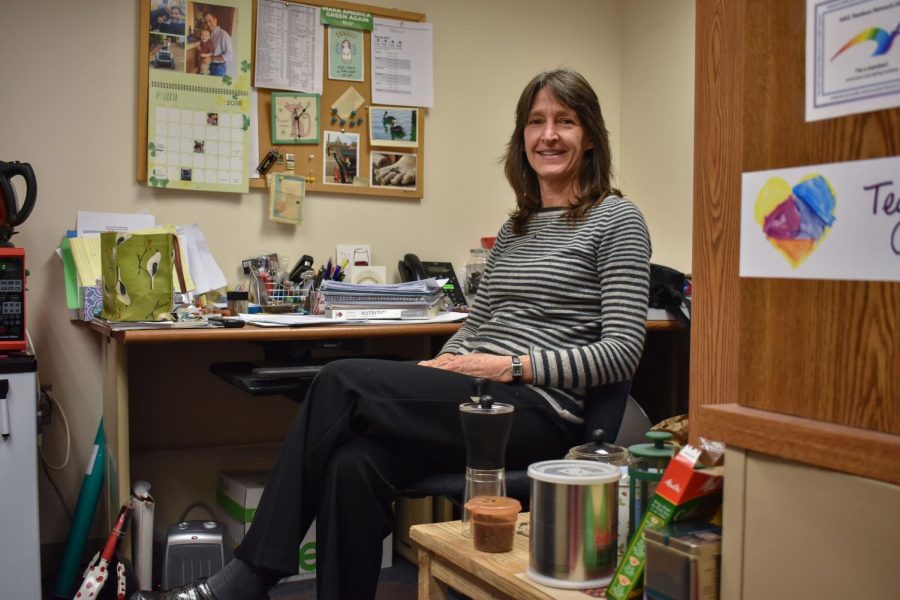Profs put Earth 1st on campus
Nutrition professor Karen Israel has filled her office with items she has found a second use for, like Mason jars, plastic silverware and paper products.
April 1, 2018
Karen Israel’s office is filled with recycled items. Shelves are lined with nutrition books and objects she’s found a second use for, like her recycled notepads, made from old, cut-up academic integrity forms, and mason jars filled with office supplies.
“I find that most things have another life,” she said.
On top of her file cabinet, three cups hold old plastic cutlery and chopsticks next to ceramic mugs. Every time Israel eats lunch at a school event, like at orientation, she saves the plastic silverware for future uses. She said some of the plastic forks she has are “probably five years old.”
Below her desk, she keeps an old paper box as a recycling bin. Even after she puts materials in the box for recycling, she still tries to find other ways to use them.
Israel, a nutrition professor, is not only environmentally conscious at work, but at home, too. She has had a compost bin behind her house for a decade.
Like Israel, other professors are environmentally conscious.
Kelly McBride, an instructional coordinator for science, said she has drastically changed her shopping habits over the past years.
McBride purchases items in bulk and, when she can, foods without packaging.
“You have to take care of the environment, and a lot of that is by recycling,” she said. “I’m aware of it now. I’m aware of all of the resources.”
Down the hall from McBride, chemistry professor Maureen Sherer thinks about how to teach her students to help the environment.
“As a chemist, I’m very interested in environmental chemistry and what we can do,” she said.
In her Chemistry 112 class, she tries to relate topics to the environment because “students love it.”
“They are always interested when the subject pertains to real life and things they care about and things that are in the news,” Sherer said.
Sherer said she tries putting an emphasis on how much humans affect greenhouse gases by burning fossil fuels and creating carbon dioxide.
“We human beings alter the natural environment. We have to talk about these serious subjects.”
Around campus, students can see some of the eco-friendly features.
In 2011, the college put in the overhead solar panels across Parking Lot B as a part of Project Sunburst.
Physics professor Eric Fons said the college should add more solar panels across campus.
“There has been a reasonable amount of interest in sustainability but there’s always more that could be done,” he said. Fons takes his students outside to explain how the panels work. But he said he believes the college should move faster to be more environmentally friendly.
Outside of his work at AACC, Fons and biology professor Paul Bushmann are heavily involved in research on the Chesapeake Bay.
Since 2013, Fons has worked on coastal beach profiles, coastal erosion surveys and numerical analyses on the Chesapeake Bay. He said global climate change might be causing the bay to erode in several areas in southern Maryland.
In the summer, other faculty members and students work alongside Fons and Bushmann to calculate the population shifts in horseshoe crabs.
“Some students [care] and some don’t,” he said.
First-year engineering student Emily Billings said the college should be more environmentally conscious.
Billings said she would like to see more recycling bins in the Dragun Science building hallways.
She also pointed to her 23-ounce, plastic Deer Park water bottle.
“I bring this water bottle to school every day and go through about three of these, and probably two out of three of them go into the trash bins” because of the lack of recycling containers, she said.
Billings suggested the college should give students reusable water bottles.
And Israel said there is “so much more we could do.”
She suggested designing new courses on composting and bringing in speakers to talk about recycling.
“It’s just so important for us to do,” she said.












